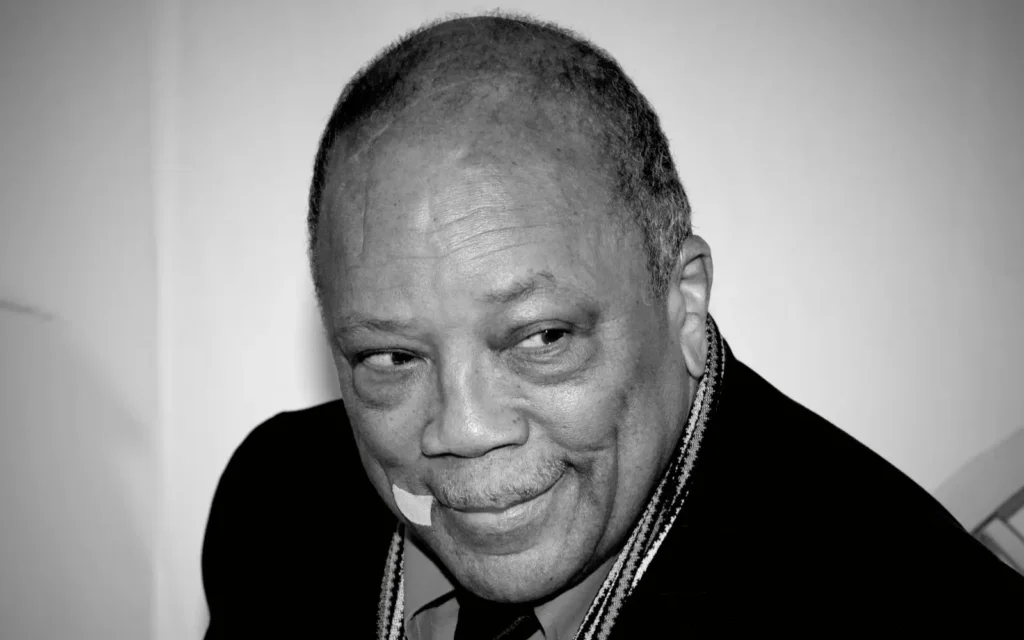Quincy Jones is a name that resonates deeply within the realms of music and entertainment. With a career spanning over six decades, Jones has not only defined the sound of contemporary music but has also influenced generations of artists across various genres. From jazz to pop, film scores to philanthropy, his multifaceted contributions make him a towering figure in the music industry.

Early Life and Musical Beginnings
Born on March 14, 1933, in Chicago, Illinois, Quincy Delight Jones Jr. grew up in a vibrant musical environment. His mother, a domestic worker, and his father, a carpenter, provided a humble yet nurturing home. Jones showed an early interest in music, learning to play the trumpet at a young age. His passion led him to the prestigious Chicago Musical College and later to a scholarship at the Berklee College of Music in Boston.
In the 1950s, Jones began his professional career as a trumpet player and arranger in the big band scene. He worked with legendary musicians such as Lionel Hampton and Dizzy Gillespie, honing his skills and expanding his musical horizons. His early experiences in jazz laid the foundation for his future endeavors, blending styles that would define his career.
A Versatile Producer and Arranger
Quincy Jones’s versatility is one of his defining traits. In the 1960s, he transitioned from jazz musician to a successful arranger and producer. His work with artists like Frank Sinatra, Aretha Franklin, and Ella Fitzgerald showcased his ability to bridge different musical styles while maintaining their unique identities.
One of his most notable achievements came when he produced Michael Jackson’s iconic albums, “Off the Wall,” “Thriller,” and “Bad.” “Thriller,” released in 1982, became the best-selling album of all time, solidifying Jones’s reputation as a top-tier producer. His innovative use of technology in the studio and keen ear for talent played a pivotal role in crafting Jackson’s signature sound.
Film and Television Contributions
Jones’s talents extend beyond music production; he has made significant contributions to film and television as well. He composed scores for various films, including “In the Heat of the Night,” “The Italian Job,” and “The Color Purple.” His work in film earned him multiple Academy Award nominations and showcased his ability to enhance storytelling through music.
In addition to his film work, Jones created the beloved theme song for the television show “The Fresh Prince of Bel-Air,” which introduced a generation to the charm of Will Smith. His contributions to the small screen further demonstrate his adaptability and wide-ranging influence.
Philanthropy and Activism
Quincy Jones is not only known for his musical prowess but also for his commitment to philanthropy and social justice. He has been involved in numerous charitable organizations, focusing on education, health, and arts programs. In 1990, he founded the Quincy Jones Musiq Consortium, aimed at providing opportunities for young musicians and promoting music education in schools.
His advocacy for global issues, particularly in the areas of racial equality and poverty alleviation, has earned him respect beyond the music industry. Jones has used his platform to raise awareness about pressing social issues, inspiring others to take action.
Legacy and Recognition
Jones’s impact on music and culture has been widely recognized. He has won an astounding 28 Grammy Awards, making him one of the most awarded individuals in Grammy history. In addition to his Grammy wins, he has received numerous honors, including the Kennedy Center Honors in 2001 and the Grammy Lifetime Achievement Award.
His autobiography, “Q: The Autobiography of Quincy Jones,” published in 2001, offers a candid look at his life, revealing the challenges and triumphs he faced throughout his career. It serves as both an inspiring memoir and a testament to his resilience in an ever-evolving industry.
Continuing Influence
Even in his later years, Quincy Jones remains a vital force in the music world. He continues to produce music, collaborate with emerging artists, and mentor young musicians. His ability to adapt to new trends while staying true to his artistic vision is a hallmark of his career.
Jones’s influence can be seen in the work of contemporary artists across genres, from pop stars like Bruno Mars and Billie Eilish to hip-hop icons like Jay-Z. His contributions to music are not merely historical; they continue to shape the soundscape of today.
Conclusion
Quincy Jones A Musical Icon is more than just a musician; he is a cultural icon whose impact is felt far and wide. His journey from a young trumpet player in Chicago to a legendary producer and humanitarian is a testament to his talent, dedication, and vision. As we celebrate his remarkable achievements, it’s clear that the legacy of Quincy Jones will endure for generations to come, inspiring countless artists and music lovers alike. In the world of music, few names carry the weight and significance of “Quincy Jones.”

























